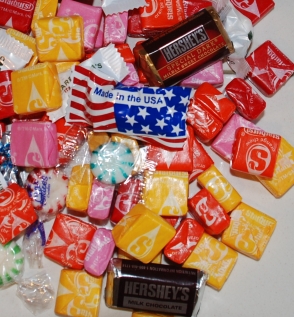
Are your over-analyzing, over-thinking, over-writing, your stories? Do you dream about your plots at night until they've become nightmares?
If so, understand that over-thinking and over-analyzing can so paralyze a writer to the point of no return. Meaning, a writer may not ever want to return to their desk to key in another word! Vascillating with our story plots can be incredibly taxing.
Like a child in a candy store who can't make a decision on which candy to buy with their limited amount of money, they stand and stare, stand and shuffle their feet, then stare some more, hoping against all hope that if they buy the bubble gum, it will be the right choice over the sour ball.
They fear making a bad decision. They say, "Let's see, the sour ball will be soooo good, but the bubble gum will last longer, even if it eventually loses its taste. But maybe the sour ball will be best--I just love sour. No wait, I can put the bubble gum on my bed post overnight. I'll need a good chew tomorrow. Better go with the bubble gum. But I came for the sour ball. Eeeek!" as they ring their hands while salivating.
In one of Aseop's fables, The Fox and the Cat, the fox boasts of hundreds of ways of escaping. The cat's thinking is more simplistic with only one way to escape; the nearest tree. When the fox and the cat hear the baying of hounds as they approach, the cat scurries up a tree while "the fox in his confusion was caught up by the hounds." While the fox was trying to determine the perfect escape route from his bag of tricks, he was out-foxed. The ending moral to this fable is, "Better one safe way than a hundred on which you cannot reckon."
Rather than over-thinking your story, sometimes it's best to keep things simple so as not to confuse your reader. I can't tell you the number of times I've heard a reader say, "I can't really tell you what the book was about, it had so many characters, I couldn't keep up with them all."
So, when it comes to your stories, remember that a decision or an outcome can become too detailed. Too over-complicated can confuse the reader to such a point that they never finish the book.
Comments anyone?
If you would like to comment or have questions about this article, email me vmoss@livingwaterfiction.com




